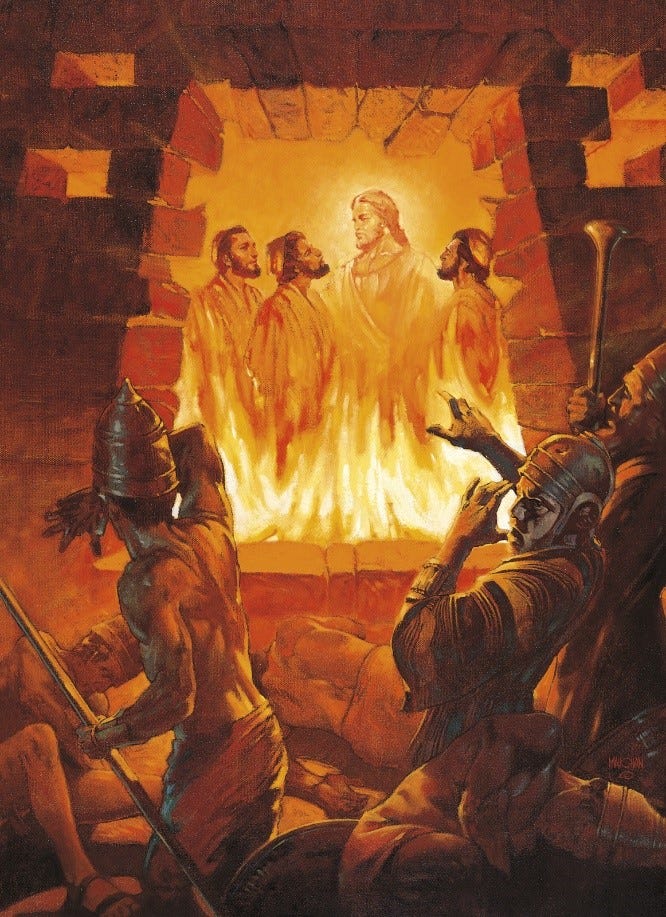Setting: Daniel was a prophet who was taken captive during the Babylonian invasion and brought back to King Nebuchadnezzar's court where he did mighty works.
Chapter Summary
Chapter 3: One day, King Nebuchadnezzar created a golden idol and commanded everyone in Babylon to bow down and worship it whenever they would hear a certain song. He said that any who did not worship it would be thrown into a fiery furnace to be killed. When the music was played, everyone bowed except Shadrach, Meshach and Abednego who refused to do so. When the king found out he was enraged and ordered them to bow or to be cast into the furnace. The 3 men bravely answered that they believed God would deliver them from the furnace but if not they still would not bow to the golden idol.
The King ordered his men to bind the 3 Jews and then to throw them into the furnace. The furnace was so hot that it killed the men who threw the 3 Jews into the furnace but God miraculously preserves them and stands with them in the fire. The King is astonished and decrees that any who speak against the God of Israel will be cut into pieces and destroyed and then promotes Shadrach, Meshach and Abednego.
Key Principles & Exposition
Context: This event occurred about 18-23 years after Daniel interpreted Nebuchadnezzar’s dream. After a period of conquests, Nebuchadnezzar was now shifting to a time of building and celebration. The Babylonian chronicle says there was a major coup attempt in 595 B.C. so this was most likely a test of loyalty to see who would worship him and who would not.
1. Shadrach, Meshach and Abednego had faith God would deliver them, but even if He didn't they resolved to be faithful: " If it be so, our God whom we serve is able to deliver us from the burning fiery furnace, and he will deliver us out of thine hand, O king. But if not, be it known unto thee, O king, that we will not serve thy gods, nor worship the golden image which thou hast set up." (Daniel 3: 17-18)
2. God miraculously preserves the faithful: "He answered and said, Lo, I see four men loose, walking in the midst of the fire, and they have no hurt; and the form of the fourth is like the Son of God." (Daniel 3:25)
The “Son of God” translation: The original Hebrew word meant something more like “son of divinity” or “divine person” and probably was not a reference that Nebuchadnezzar made to Jesus. (The Book of Daniel
3. The enemies of God will seek to use the government to enforce worship of false gods: “The three charges leveled against the three were: first, a disregard and disrespect to the king; second, not worshipping the nationals gods and third; not bowing down to the image.” (The Book of Daniel)
4. But if not…
“Our God will deliver us from ridicule and persecution, but if not. … Our God will deliver us from sickness and disease, but if not. … He will deliver us from loneliness, depression, or fear, but if not. … Our God will deliver us from threats, accusations, and insecurity, but if not. … He will deliver us from death or impairment of loved ones, but if not, … we will trust in the Lord.
Our God will see that we receive justice and fairness, but if not. … He will make sure that we are loved and recognized, but if not. … We will receive a perfect companion and righteous and obedient children, but if not, … we will have faith in the Lord Jesus Christ, knowing that if we do all we can do, we will, in His time and in His way, be delivered and receive all that He has.”
5. Nebuchadnezzar may have been challenging Daniel’s dream by building the statue: “There is a discernible link between Nebuchadnezzar’s dream in Daniel 2 and the image he made in Daniel 3. It seems that Nebuchadnezzar deliberately made an entire statue of gold, to say that the day of his reign and authority would never end – in contradiction to God’s declared plan.” (Enduring word)
6. The three faithful Jews made no excuse for disobeying God’s commandments. The saw obedience to God as an absolute regardless of consequences: “Often when God blesses us, we make the blessing an idol and compromise God to keep what we have.” (Enduring word)



